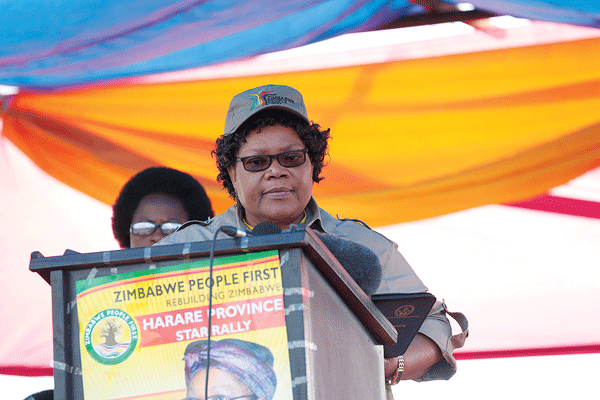
ZIMBABWE People First (ZimPF) leader, Joice Mujuru, yesterday waved a defiant fist, declaring she was now geared to contest next year’s presidential race against President Robert Mugabe, with or without the electoral reforms demanded by her counterparts in the country’s opposition ranks.
BY RICHARD CHIDZA
In a statement posted on her Facebook wall, which was confirmed by the ZimPF leader’s spokesperson, Gift Nyandoro, Mujuru told her supporters that boycotting the 2018 elections was not an option, despite her party’s poor showing in the just-ended Bikita West parliamentary by-election.
“Clearly, our opponents have not changed their unorthodox dirty campaign strategies, which include violence, intimidation and vote-buying. This experience will inform our strategy for tackling the 2018 election,” she said.
“To all our supporters in Zimbabwe and in the Diaspora, friends and other opposition parties, I would like to assure you that we are committed to democratic elections. We will contest the forthcoming elections regardless of the prevailing conditions.”
Nyandoro said Mujuru, however, supported the call for electoral reforms.
“If you look at that statement, she says the party supports democratic processes. Democratic processes by nature should be nothing short of an electoral environment that is free from intimidation, violence, coercion and where all existing rigging apparatus that Zanu PF uses at every election is non-existent,” he said.
“But I want to state categorially that our party’s position is very clear: Boycotting is not an option. If that discourse (on a possible boycott) were to crop up at some point before the elections, we will cross the bridge when we come to it. We hope all opposition parties are not going to connive to give the ruling party the satisfaction of a walkover in the general elections.”
- Chamisa under fire over US$120K donation
- Mavhunga puts DeMbare into Chibuku quarterfinals
- Pension funds bet on Cabora Bassa oilfields
- Councils defy govt fire tender directive
Keep Reading
Mujuru said participating in elections would be an affirmation of the country’s democratic ideals built on the liberation struggle ethos.
“Fellow Zimbabweans, elections are the foundation upon which democracy is built. The principle of one-man one-vote is the reason why Zimbabweans fought the war of independence and emerged victorious in 1980,” she said, paying tribute to those who voted in the by-election won by Zanu PF’s Beauty Chabaya after trouncing ZimPF’s Kudakwashe Gopo by over 10 000 votes.
“Today, young Zimbabweans face a different kind of enemy, which is poverty, unemployment, disease and fear,” she said.
MDC-T leader, Morgan Tsvangirai is leading a host of pro-democracy groups demanding electoral reforms ahead of next year’s elections, although Zanu PF has vowed that “we will not reform ourselves out of power”.
Tsvangirai has boycotted all electoral processes since his humiliating loss to Mugabe in the 2013 general elections.
The former trade union leader said the elections were rigged by Zanu PF, with the assistance of a shadowy Israeli firm known as Nikuv Projects.
Mujuru’s decision to take part in the Bikita West by-election, analysts argue, could backfire and work against her in talks with Tsvangirai towards a common presidential candidate to face Mugabe, who will be 94 and likely contesting in his last elections, as stipulated in the 2013 Constitution.
Tsvangirai refused to commit to supporting Mujuru’s candidate in the by-election, despite having gone all-out to back independent candidate, Temba Mliswa, to victory in the Norton by-election late last year.
While manoeuvres for a coalition continue to drag, with conflicting signals from all opposition parties, Tsvangirai seemingly remains on the fence on whether he will take part if Mugabe refuses to implement the reforms that the former Prime Minister is demanding.







